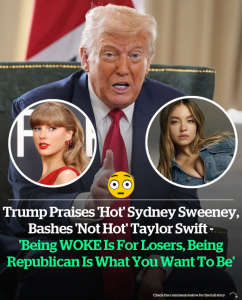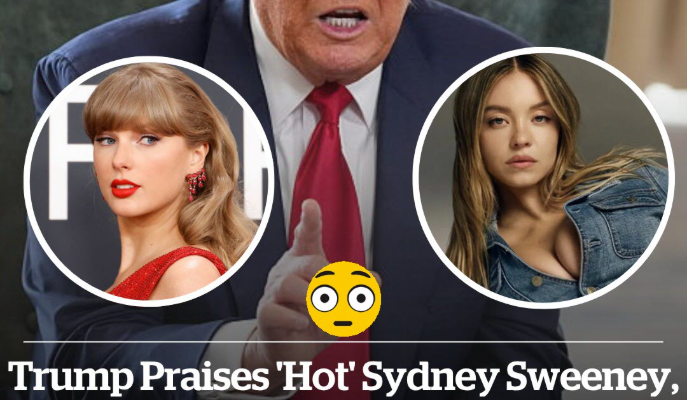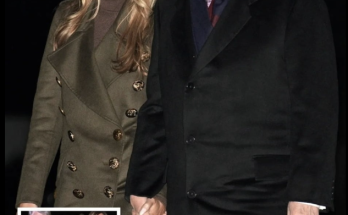Donald Trump has always had a knack for turning celebrity culture into political theater. In early August 2025, he did it again—this time by singling out actress Sydney Sweeney for public praise while using Taylor Swift as a foil. The remarks, delivered through a Truth Social post, ignited days of debate, laughter, outrage, and analysis, showing how seamlessly Trump continues to intertwine politics with pop culture.
It began with a jeans commercial. American Eagle had launched a bold new campaign starring Sweeney titled “Sydney Sweeney Has Great Jeans,” playing cheekily on the pun between “jeans” and “genes.” The advertisement, filmed with the actress strolling confidently in classic denim, instantly went viral. Critics called it tone-deaf for its implied focus on beauty and biology, but fans of the actress defended it as fun, stylish, and quintessentially American. Regardless of the debate, the ad worked—it put Sweeney at the center of attention.
Enter Trump. Logging into his Truth Social account, he typed a post that quickly made headlines around the world. “Sydney Sweeney is HOT. The hottest ad campaign out there right now. Everyone’s talking about it, the jeans are flying off the shelves. She’s a Republican, too—fantastic!” His words were blunt and unmistakably Trumpian, mixing a compliment about Sweeney’s looks with a political nod to her party registration. Almost immediately, the comment spread across media outlets, sparking fresh conversation about the boundaries between celebrity endorsements, politics, and objectification.
But Trump was not content to stop there. In the very same breath, he shifted gears to attack Taylor Swift, one of the most influential cultural figures alive. “Taylor Swift is no longer hot,” he declared. “She got booed at the Super Bowl. Everyone knows it. I said a long time ago I can’t stand her, and now look at her—downhill. Not hot anymore, thanks to me.”
It was vintage Trump: praise one star, denigrate another, and place himself at the center of the narrative. By contrasting Sweeney and Swift, Trump tapped into the cultural divide that has defined much of his political rhetoric. Sweeney, with her Republican affiliation and a campaign steeped in traditional Americana aesthetics, became his example of what is “right.” Swift, with her progressive politics and outspoken Democratic endorsements, was cast as his example of what is “wrong.”
The comments hit a nerve. Taylor Swift is not just a pop singer but a global phenomenon with a billion-dollar fortune, record-breaking tours, and a fan base that rivals political movements in size and fervor. She has become increasingly outspoken about politics, urging her followers to register to vote and endorsing Democratic candidates. For Trump, who thrives on rallying his base against cultural giants he paints as “woke,” Swift is a natural adversary. In his telling, her decline is proof of his influence—though in reality, her popularity continues to soar worldwide.
Sydney Sweeney, by contrast, had never sought to become a political flashpoint. Known for her roles in shows like “Euphoria” and films that showcase both her range and her marketability, she had largely stayed out of partisan fights. But once the revelation of her Republican registration came to light, she became a conservative darling almost overnight. Trump’s gushing remarks about her jeans ad elevated that transformation, cementing her as a symbol—whether she wanted it or not—of resistance to progressive celebrity culture.
The fallout was swift. Fans of Taylor Swift rushed to defend her, pointing out that she remains one of the most powerful entertainers in the world, with a career untouched by Trump’s disapproval. They argued that calling her “no longer hot” was a sexist attempt to reduce a woman’s worth to her physical appearance, ignoring her artistry, business acumen, and political clout. Meanwhile, conservatives seized on Trump’s words, circulating clips of Sweeney’s commercial as a proud counterweight to Swift’s perceived liberal dominance.
The financial markets even seemed to react. After Trump’s glowing praise of the American Eagle ad, the company’s stock enjoyed a noticeable surge, rising double digits in a matter of days. Analysts debated whether the bump was directly tied to Trump’s remarks or simply to the viral success of the campaign, but either way, the incident showcased the strange power of cultural commentary in a world where celebrity and politics are inseparable.
For Trump, the episode served multiple purposes. It reminded his followers of his disdain for Taylor Swift, a figure he has long portrayed as emblematic of Hollywood elitism. It allowed him to embrace Sydney Sweeney as a fresh conservative icon. And most importantly, it kept him at the center of the news cycle, demonstrating once again his ability to dominate headlines with a single social media post.
But beyond the theatrics, the moment also revealed deeper truths about American society in 2025. The first is the degree to which female celebrities continue to be discussed in terms of “hotness,” attractiveness, and desirability—a discourse that many critics say reduces them to objects in ways that are outdated and harmful. The second is the political weaponization of culture. By turning Sweeney and Swift into symbols of competing ideologies, Trump blurred the line between personal taste and partisan loyalty.
The irony, of course, is that both women have built careers on their own terms, independent of Trump’s praise or criticism. Sydney Sweeney may be a Republican, but her career choices have rarely aligned with overt political messaging. Taylor Swift, for her part, has risen above countless dismissals and attacks to become not just a singer but a cultural force whose endorsements can sway voter turnout. In many ways, Trump’s comments said more about him—and about his strategy—than about either woman.
Still, the incident struck a chord because it touched on something bigger than politics or entertainment. It raised questions about how we measure success and influence in an age dominated by celebrity. Is it through popularity? Political affiliation? Financial gains? Or is it something more intangible, like the ability to shape conversations and inspire action? By those measures, both Swift and Sweeney remain enormously powerful, albeit in very different ways.
In the days that followed, late-night comedians lampooned Trump’s remarks, talk shows dissected the subtext, and online debates raged. Some dismissed the episode as another Trump sideshow, designed to distract from policy discussions. Others saw it as a revealing snapshot of how modern politics operates, fueled as much by cultural signaling as by actual governance.
In the end, one post about jeans and “hotness” managed to encapsulate the strange fusion of entertainment, politics, and commerce that defines the current era. For Trump, it was a victory in attention. For Sydney Sweeney, it was an unexpected turn into political discourse. And for Taylor Swift, it was just another example of being used as a symbol in battles that extend far beyond music.
Whether the story fades or lingers, one thing is clear: in today’s world, a single comment can ripple across industries, shape stock prices, ignite partisan divides, and dominate cultural conversation. And nobody, perhaps, understands that better than Donald Trump.


